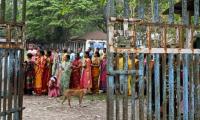Dublin: Schools in Ireland will close for the rest of the month as a "tsunami of infection" threatens to overwhelm the healthcare service, the government said on Wednesday.
"We simply have to suppress this surge," prime minister Micheal Martin told reporters in Dublin, announcing a raft of new coronavirus restrictions.
For January, schools will be closed with limited exceptions only for special education students and those preparing for exams.
All construction will also cease until February, apart from a small number of exempt projects such as essential repair and social housing works.
Martin said hospitals in Ireland "are under siege from the disease" and "now facing a tsunami of infection".
"The lockdown we are introducing today is designed to reflect that stark and simple reality," he added.
"Unless you are involved in absolutely essential work, you have no reason to be away from your home, and you simply must stay at home."
Ireland is already in the midst of a third virus lockdown with non-essential shops shut, bars and pubs closed, and citizens asked to work from home.
Latest official figures show 2,282 have died from the virus in the Republic to date.
On Monday the health ministry announced 6,110 new infections in the daily toll -- a record high.
Earlier on Wednesday, the head of Ireland’s national health service said there were 921 people in hospital -- more than during the first wave of infections in early 2020.
"We’re facing into what’s going to be a really dark January -- a third wave that could be much worse than the first," warned deputy prime minister Leo Varadkar.
"Hospitals and (intensive care units) not overwhelmed in the first wave are at serious risk of being so later this month."
The government also announced that a ban on travel from Britain, where the virus is also surging, will expire on Saturday.
However arrivals will have to present a negative test carried out within the past 72 hours.
Meanwhile, travel has been restricted in a northern Chinese city of 11 million as authorities on Wednesday moved to snuff out a Covid-19 cluster, while health officials in another province detected a new virus strain found in South Africa.
Ten major highways leading into the city of Shijiazhuang, around 300 kilometres (200 miles) south of Beijing, have been closed and a bus terminus was also shut in an attempt to prevent the virus spreading beyond the city in Hebei province.
There have been 117 cases in the city -- including at least 63 more reported Wednesday -- 78 of which were asymptomatic, prompting mass testing across the affected area.
The same day, health authorities in southern Guangdong province reported a case involving a mutant virus strain found in South Africa.
The strain detected in China was isolated from a swab of a South African pilot who had entered the province in December and tested positive for Covid-19, said the Guangdong Provincial Centre for Disease Control and Prevention.
Its announcement comes days after China confirmed its first case of a new coronavirus variant detected in Britain, prompting widespread concern as both strains are said to be more infectious.
Unlike much of the world, China has largely brought the virus under control through strict lockdowns and travel restrictions.
But there have been a series of local outbreaks in recent weeks, prompting mass testing and targeted lockdowns.
The village of Xiaoguozhuang within the city boundary has been classified as a "high risk" district and sealed off. Health authorities said all 40,000 residents in that district have been tested for the virus. State TV showed villagers being tested by staff in full hazmat suits and protective wear, with roadblocks staffed by police and medical workers.
All schools in Shijiazhuang have been closed.
State broadcaster CCTV showed teams of health workers spraying disinfectant across streets and said an emergency team of medical workers had been sent to the city.
More than 400,000 residents of another nearby city, Nangong, have also been tested, authorities said.
Beijing is also racing to vaccinate millions ahead of the Lunar New Year travel rush next month.
Meantime, more than 600 journalists have died of Covid-19 last year since March 1, a press freedom organisation said, calling for media workers to have priority access to vaccines.
The Press Emblem Campaign (PEC), which tracks the deaths of journalists around the world, said that of the 602 media workers known to have died from the new coronavirus, more than half were from Latin America, with 303 fatalities.
In a related development, British Prime Minister Boris Johnson on Wednesday said the coronavirus marathon had turned into a hopeful sprint to vaccinate millions in the weeks ahead but justified another lockdown to relieve crisis-hit hospitals.
Hastily recalled lawmakers were to vote on the lockdown retrospectively after it took effect across England overnight, forcing schools to close this week as part of a stay-at-home order, while the UK’s other nations have imposed similar curbs.
Johnson said a variant strain of the virus which emerged in southeast England last month was spreading with "frightening ease and speed", worsening one of the world’s worst death tolls.
Official data show that one in 50 people in England were infected last week, rising to one in 30 in London, and many hospitals say they are swamped with Covid-19 patients.
Former US president Donald Trump. — AFP NEW YORK: The judge overseeing former US president Donald Trump’s...
Bosnian Serb leader Milorad Dodik. — AFP FileSARAJEVO: The parliament of Bosnia´s autonomous Serb Republic adopted...
Australia's Prime Minister Anthony Albanese speaks during the opening ceremony of the 6th China International Import...
Indonesia's Ruang volcano. — AFP JAKARTA: Indonesia shut a provincial airport and evacuated hundreds of people...
Myanmar’s detained former leader and Aung San Suu Kyi. — AFP LONDON: Myanmar’s detained former leader and Aung...
President Ruto is seen with the chief of the Kenya Defence Forces General Francis Ogolla in this photo on 28 February....







